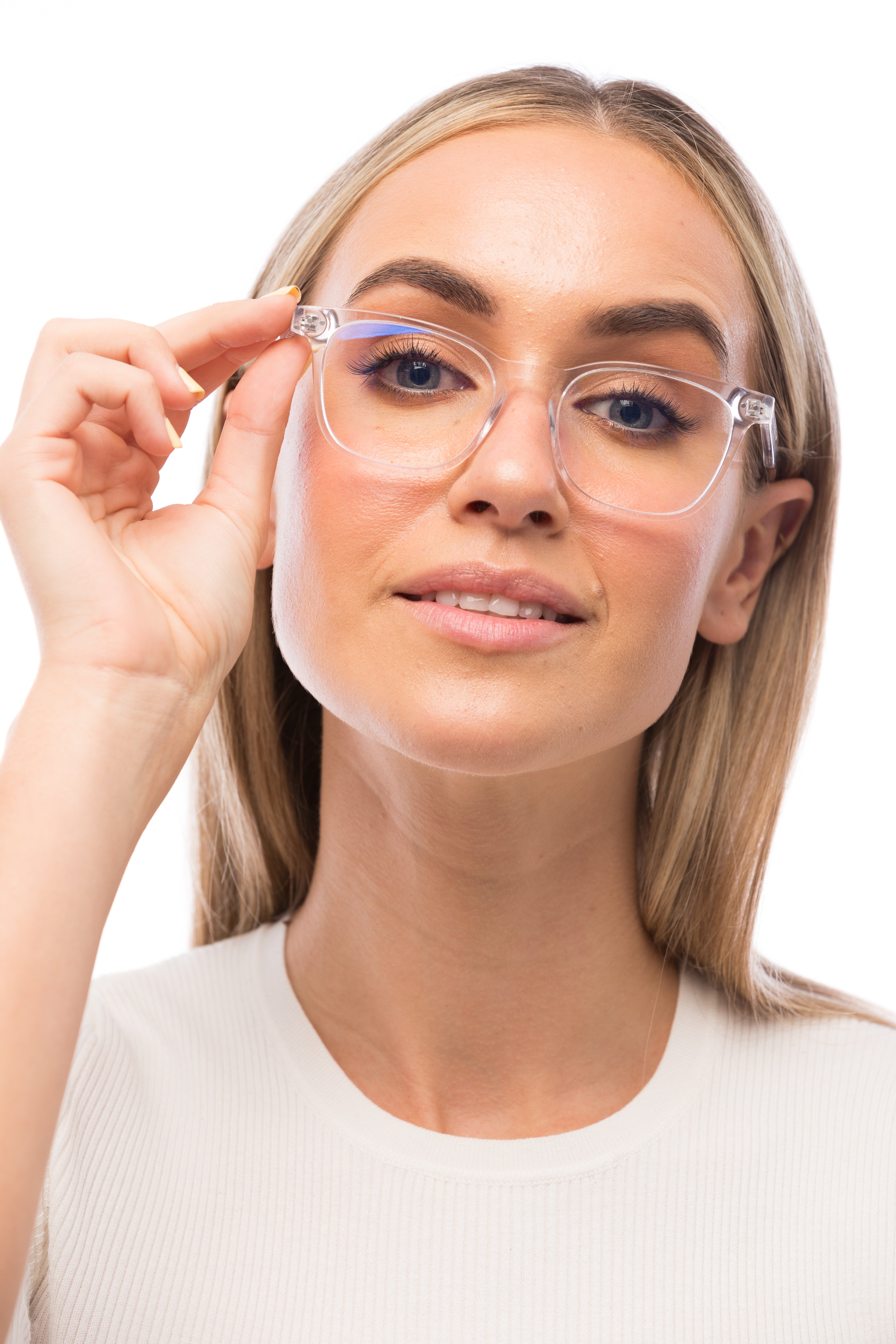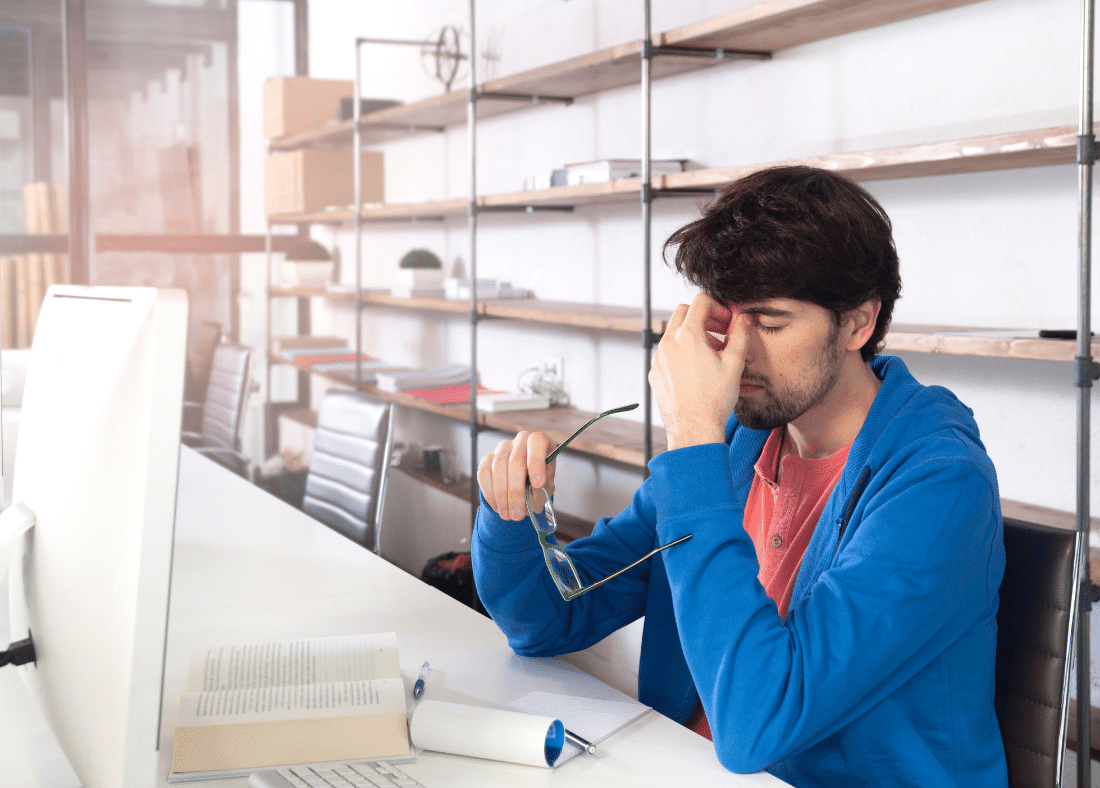Can Blue Light Glasses Damage Your Eyes?
Andy MantBlue light glasses can damage your eyes. However, context needs to be applied to this statement. Wearing the incorrect blue light blocking glasses at the wrong time of day can be detrimental to your circadian biology.
If you wear blue light blocking glasses (red lenses) during the daytime you can confuse the brain into thinking it's nighttime and this may make you feel drowsy and tired. If you wear clear lens computer glasses after sunset you will disrupt your sleep negatively as you will be allowing too much blue light to enter your eyes. This will advise your circadian rhythm its daytime and keep you alert and awake.
The Dangers of Blue Light Exposure After Dark
Blue light signals our brains to determine the time of day. Blue light tells our brains that it is daytime and to be alert and awake. this has been happening for millennia as all life on earth evolved with a circadian clock mechanism to predict environmental stressors, keep hormones balanced and allow us to sleep.
It can be an awful idea to see blue light after sunset as we need to send the appropriate messages to our circadian rhythms to notify us night-time is approaching and to prepare to sleep. Blue light after sunset does not improve our sleep.
Blue light is not naturally present after sunset so by switching on our televisions, turning on our house lights or even opening our fridge, along with other sources of blue light, is convincing our brains it is daytime and that we don’t need to sleep properly.
Blue light blocking glasses (red lens) should block 100% of blue light between 400 nanometers and 550 nanometers. Exposure to blue light is a negative thing after sunset as is destroys our sleep quality.

It’s vitally important to make sure your blue light blocking glasses block 100% of light between 400-550nm, or they will be ineffective and confusing messages will still be sent to your circadian clock mechanism about what time of day it is.
Why Natural Blue Light During the Day is Essential
Blue light during the day is essential for optimised wellbeing. However screen time is rapidly increasing which can lead to eye related conditions.
Blue light from the sun helps with dopamine, serotonin and cortisol production. However, we get too much blue light during the day from all the artificial suns we have brought into our lives, from your smartphone, laptop, office LED lights and televisions. This overload of blue light from digital devices can significantly damage your eyes. Evidence that blue light is bad for our eyes during the day has be demonstrated in numerous academic studies.
Ancestrally speaking, we would have been in the sun all day and then after sunset we would have had zero blue light meaning our eyes could repair themselves. We are now exposed to blue light all day and night.
Why Time of Day Matters
Do blue light blocking glasses damage your eyes is really the wrong question to ask, as it is blue light that significantly damages your eyes. A precision pair of blue light glasses may damage your eyes if worn at the wrong time of day.
Blue light is high energy visible light. This type of light can cause cellular damage to the eye in the form of digital eye strain, headaches and migraines.
Using the correct blue light filtering glasses at the correct time of day can actually help protect against the potentially damaging effects of blue light.

Blocking too much blue light from digital screens during the daytime can disrupt your circadian rhythm and leave you feeling fatigued later on during the day. Blocking too little blue light from blue light emitting devices after sunset can disrupt your sleep quality and leave you feeling exhausted the next day.
Ways to Protect Your Eyes From Excess Blue Light
There are several ways in which you can protect and prohibit damage from blue light.
- Being outside in the sun is a great way to reduce artificial blue light exposure. This works as the sun emits red light, which is restorative and protects against the damage induced by blue light exposure.
- Wear Computer Glasses (clear lens) during the day and a pair of Blue Light Blocking Glasses after sunset (red lens)
- The 20-20-20 rule is a fantastic method for preventing digital eye strain. Every 20 minutes you work at your computer look at an object 20 feet away for 20 seconds. This method helps minimise screen time and keep your eyes feeling refreshed. This method is supported by the American Academy of Ophthalmology.
- By using artificial tears you can help protect against blue light. Eye drops are a fantastic way to prevent blue light damage to your eyes as they help lubricate your eyes.
- By sitting 25 inches from your monitor screen you can help with vision problems. Sitting too close to your screens can cause significantly more eye damage from blue light. Sitting 25 inches from your computer monitor can help dramatically reduce symptoms of digital eye strain.
Conclusion
Blue light is essential during the day and we should not block all of it. Filtering out between 5-30% is usually enough to help mitigate against digital eye strain.
Whether blue light blocking glasses damage your eyes should have context applied to it. If you wear clear computer glasses post sunset you will be still exposing your eyes to excessive blue light and negatively impact your sleep.
After sunset the eye should receive no blue light so if your lenses are clear, like many computer glasses are, you should not be wearing them after dark.
Light needs fluctuate throughout our circadian day and to stop blue light blocking glasses from damaging your eyes you should wear a clear or yellow lens during the day when indoors and a red or orange lens after sunset.
If you wear blue light glasses at the correct time of day you will not damage your eyes. Instead you will protect your eyes from damaging artificial blue light.
Further Reading
What are Blue Light Glasses – Benefits and Supporting Science
Dry Eye Syndrome: What Causes Dry Eyes And How Is It Treated?




